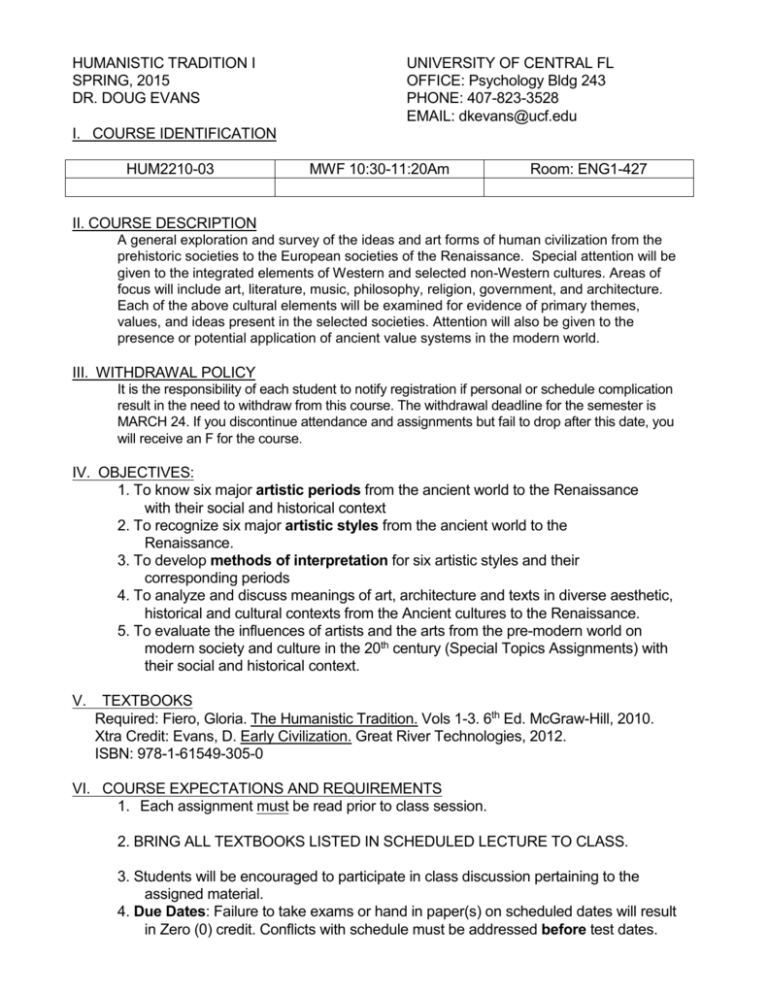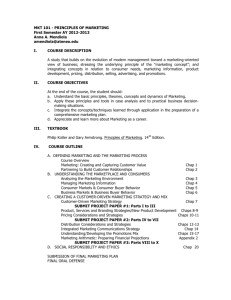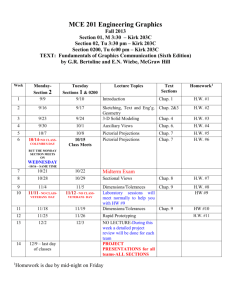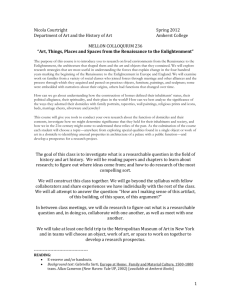ancient to renaissance_edison community college
advertisement

HUMANISTIC TRADITION I SPRING, 2015 DR. DOUG EVANS UNIVERSITY OF CENTRAL FL OFFICE: Psychology Bldg 243 PHONE: 407-823-3528 EMAIL: dkevans@ucf.edu I. COURSE IDENTIFICATION HUM2210-03 MWF 10:30-11:20Am Room: ENG1-427 II. COURSE DESCRIPTION A general exploration and survey of the ideas and art forms of human civilization from the prehistoric societies to the European societies of the Renaissance. Special attention will be given to the integrated elements of Western and selected non-Western cultures. Areas of focus will include art, literature, music, philosophy, religion, government, and architecture. Each of the above cultural elements will be examined for evidence of primary themes, values, and ideas present in the selected societies. Attention will also be given to the presence or potential application of ancient value systems in the modern world. III. WITHDRAWAL POLICY It is the responsibility of each student to notify registration if personal or schedule complication result in the need to withdraw from this course. The withdrawal deadline for the semester is MARCH 24. If you discontinue attendance and assignments but fail to drop after this date, you will receive an F for the course. IV. OBJECTIVES: 1. To know six major artistic periods from the ancient world to the Renaissance with their social and historical context 2. To recognize six major artistic styles from the ancient world to the Renaissance. 3. To develop methods of interpretation for six artistic styles and their corresponding periods 4. To analyze and discuss meanings of art, architecture and texts in diverse aesthetic, historical and cultural contexts from the Ancient cultures to the Renaissance. 5. To evaluate the influences of artists and the arts from the pre-modern world on modern society and culture in the 20th century (Special Topics Assignments) with their social and historical context. V. TEXTBOOKS Required: Fiero, Gloria. The Humanistic Tradition. Vols 1-3. 6th Ed. McGraw-Hill, 2010. Xtra Credit: Evans, D. Early Civilization. Great River Technologies, 2012. ISBN: 978-1-61549-305-0 VI. COURSE EXPECTATIONS AND REQUIREMENTS 1. Each assignment must be read prior to class session. 2. BRING ALL TEXTBOOKS LISTED IN SCHEDULED LECTURE TO CLASS. 3. Students will be encouraged to participate in class discussion pertaining to the assigned material. 4. Due Dates: Failure to take exams or hand in paper(s) on scheduled dates will result in Zero (0) credit. Conflicts with schedule must be addressed before test dates. 5. Class attendance is required and is the responsibility of the student. Tardiness disrupts everyone, so be on time. Turn off cell phones & computers. 6. Interpretation Papers: each student must prepare and submit four papers. Each interpretation paper will develop a topic from one of six periods discussed in class. The periods are: Prehistoric, Ancient, Classical, Hellenistic, Byzantine, Middle Ages, and Renaissance. Topical areas to choose from include: Music, literature, art, architecture, and Philosophy/Religion. The papers are due no later than the dates listed below. PAPERS MUST BE PRINTED to hand in. Each paper must also include a works cited for all source references (no more than 2 internet sources). The paper should reflect the views of the student including comments, conjecture, & interpretation. Personal points of view defensible through research are encouraged. Grammar, spelling, neatness, and verbal clarity will be considered in the grade along with content. Interpretation Procedure: 1) Choose art from the Topic Sheet. 2) Identify the Artistic Period. 3) Identify the original audience [see Analysis Sheet]. 4) Use Analysis Sheet to select details of the art which appear significant. 5) Develop the possible meaning(s) of each detail for the audience. 6) Explore the value of the art: why was it important to each audience? Determine if the value changed over time and why. Plagiarism: defined as uncited use of sources (copying without giving credit) will result in a 0 for the assignment. Formatting: 1) MLA or APA 2) NO Title Page, just title on first page. Include class Info in the header 3) Page #’s in the header with name 4) NO BINDERS, staple only 5) Double Spaced 6) One inch margins VII. GRADING PROCEDURES AND COMPUTATION Three exams: 55% (combined) 4 Interpretation Papers 40% Class attendance and Discussion 5% Grades: A=100-90, B=89-80, C=79-70, D=69-60. (+/- scale: 0-2=minus, 7-9=plus) VIII. PERSONAL GRADE RECORD (see In-Progress Grade in MyUcfGrades) Test 1 Test 2 Test 3 Papr 1 Papr 2 Papr 3 Papr 4 AVG Calculation equation: Total tests/3 X 55% + total papers/4 X 40% + (5) = average 2 CLASS SCHEDULE DATE READINGS & ASSIGNMENTS Jan 12 Introduction to Humanities. HT: Introduction Jan 14-28 PART 1: The Beginning of Civilization—Myth, Legend, & History HT: Vol 1, Intro - Chap 2, "Prehistory and the Birth of Civilization". Handout: Ovid, Metamorphoses, Book I Jan 19 Martin Luther King Day Jan 30Feb 11 PART II: Greek Civilization: Triumph of Humanism and Reason (Chaps 4-5) HT: Vol 1, Chap 4, "Greece: Humanism and The Speculative Leap." Feb 16 1st Paper Due Feb 13-18 HT: Vol 1, Chap 5, "The Classical Style." Feb 20 Test 1 (Intro-Ch 5) Feb 23March 2 March 4-6 PART III: Pax Romana and The Roman Legacy (Chap 6) HT: Vol 1, Chap 6, "Rome: The Rise of Empire" PART IV: The Shaping of the Middle Ages (Chaps 8-9) The Beginnings of Christianity HT: Vol 2, Chap 8, “A Flowering of Faith: Christianity and Buddhism” Handout: Ovid, Metamorphosis, Book 15: “The Teachings of Pythagoras” March 9-14 Spring Break March 18 2nd Paper March 16-20 Byzantium: The Rule of Christendom HT: Vol 2, Chap 9, “The Language of Faith: Symbolism and the Arts” March 24 Monday, Withdrawal Deadline 3 DATE READINGS & ASSIGNMENTS PART V: THE RISE OF ISLAMIC SOCIETY (Chap 10) March 23-25 The Birth and Spread of Islam HT: Vol 2, Chap 10, "The Islamic World: Religion and Culture" March 27April 3 PART VI: THE MEDIEVAL WEST (Chaps 11-13) The Synthesis of Christian beliefs with Pagan Society HT: Vol 2, Chap 11-13 Handout: Dante, Divine Comedy & “What is Medieval” April 6 Test 2 April 8 3rd Paper April 8-10 PART VII: RENAISSANCE AND REFORMATION The 1300’s, Century of Transition to Realism HT: Vol 3, Chap 15, “Adversity & Challenge: The Fourteenth Century April 13-17 The Challenge of Humanism to Christianity HT: Vol 3, Chap 16, “Classical Humanism in the Age of the Renaissance” April 20-22 Humanism as Ideal Expressed in Art and Invention HT: Vol 3, Chap 17, “Renaissance Artists” April 24-27 Humanism as Protest in Christianity and Society HT: Vol 3, Chap 19, “Protestant Reform: The Waning of the Old Order” April 27 4th Interpretation Paper Test 3: FINAL EXAM May 4 Monday, 10:00am 4






